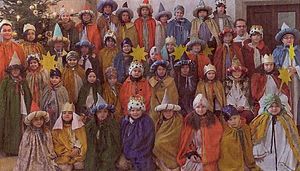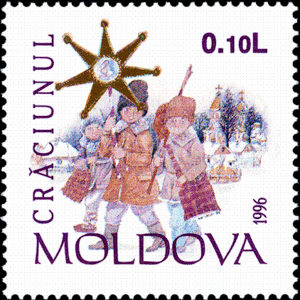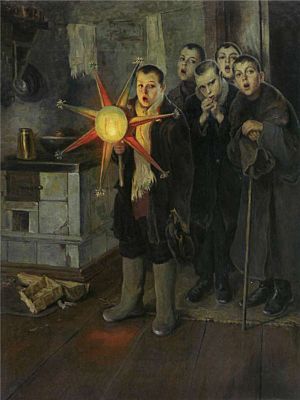Star singers facts for kids
Star singers are children and young people who go from house to house carrying a star on a pole. They often wear crowns and costumes that look like the Three Wise Men from the Christmas story. This tradition is also called Epiphany singers or Star boys' singing procession (in England).
The tradition started from old plays in the Middle Ages. These plays were about the Wise Men in the Gospel of Matthew from the Bible. Star singing usually happens between December 27 and January 6, which is the day of Epiphany.
In places like Scandinavia and Central Europe, special songs are sung by star singers. These songs are different from regular Christmas carols. In England, the plays changed over time. They started with schoolboys in churches and became more like folk plays. Today, both boys and girls take part in star singing in most places where it is still popular.
Contents
The Story of Star Singers
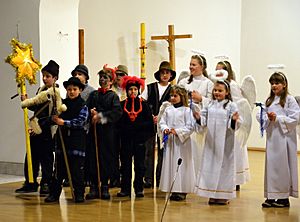
The tradition of star singing has a long history. It became very popular after a church meeting in Konstanz, Germany, in 1417. At this meeting, British church leaders performed a Star boy play. They wore fancy costumes and had a big, bright star. Everyone at the meeting loved it! This helped the play become well-known across Europe.
The importance of Epiphany, also known as Twelfth Day, grew when the Gregorian calendar was introduced. This day was also considered Old Christmas Day by the older Julian calendar.
After the Reformation in the 1500s, students from church schools in Protestant countries continued these processions. They used them to collect money because the church no longer supported them as much. Over time, the custom spread to regular people as a kind of story-telling play. However, its original form became less common by the late 1800s.
Since then, star singing has become popular in many parts of Europe. This includes both Catholic and Protestant areas, and even Russia. In most countries, it's not just for boys anymore. Children of all genders can join in. In Germany, Austria, and Belgium, groups help organize these processions. They collect money for charity or to help people in other countries. This has made the tradition very well-supported.
Star Singers in Central Europe
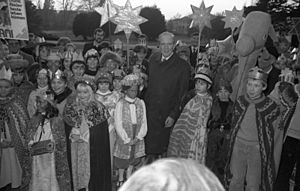
In Germany, the Czech Republic, and Austria, star singing happens around Epiphany (January 6). It has become a country-wide custom. Children of all genders visit homes and are given sweets and money. This money is collected for charity projects. Most of it goes to help children in poorer countries.
A special tradition in Central Europe is writing a blessing above the main door of a home. For example, if the year is 2014, they would write "20 * C + M + B + 14". The letters "C + M + B" stand for a Latin phrase: "Christus mansionem benedicat". This means "May Christ bless this house". People also often say the letters stand for the names of the Three Wise Men: Caspar, Melchior, and Balthasar. In Catholic parts of Germany and in Austria, the Sternsinger (Star singers) do this. After they sing their songs, say a poem, and collect donations, they write the blessing with chalk on the door frame. Sometimes they use a sticker with the blessing instead.
In Germany
Every year, about 300,000 people help collect donations in Germany.
In Austria
In Austria, the largest carol singing event is organized by "DKA" (Dreikönigsaktion). This is a charity group started by the youth organization Katholische Jungschar. About 85,000 children and 30,000 adults take part in the "Dreikönigsaktion" each year.
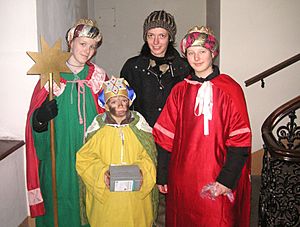
In Slovakia
The biggest carol singing event in Slovakia is called Dobrá Novina, which means "Good News". It is one of the largest charity events for young people in the country. Dobrá Novina is organized by the youth group eRko.
Star Singers in England and Scotland
In England, star singers are usually between ten and fifteen years old. They wear long white shirts and pointed paper hats, often brown or white. These outfits are meant to look like the Wise Men. Balthazar carries the star, while Caspar and Melchior have wooden swords. Other characters wear long shirts, often in brown, green, or gray, with cone-shaped hats. Joseph has a tall paper hat and carries a wooden timber or a large axe. King Herod wears a crown, and he and his soldiers carry wooden swords. Shepherds with long shirts and sticks, and angels with white shirts and wings, might also be part of the group.
The star singers walk from house to house, "singing at the doors, with a star on a pole". The play starts when one of the Wise Men knocks on a door and asks, "May the star come in?" If the people inside agree, everyone is invited in. Then, the whole group enters the home, singing a special Christmas carol. After that, the play begins.
In the play, the Three Wise Men, Gaspar, Melchior, and Balthazar, first meet Joseph. Joseph tries to protect the baby Jesus (a doll) and his wife Mary from the newcomers with his wooden axe. But the Wise Men are welcomed inside after they say they have brought gifts for the child. The Wise Men also have to trick King Herod, who is trying to find the new baby "prince" in the stable. Gaspar and Melchior fight the king and his men with swords. Joseph helps them with his axe. Meanwhile, Mary takes care of her son, and Balthazar holds the shining star.
After the play, Judas comes to collect money or other gifts from the audience in a large bag. The children are usually given drinks and cakes afterward. Then, the star singers leave the house for their next visit in the neighborhood. They sing a song to say goodbye and thank everyone for the gifts.
The star itself is made new each year. It uses clear paper on a wooden frame, with one to three candles inside. The star on the pole must be able to move and turn constantly. This stops the paper from getting too hot and catching fire.
The Star boys' singing procession in England later mixed with other types of carol singers at Christmas. They don't go from house to house anymore. Instead, they visit two or three local pubs to get free beer. Today, they often don't carry the shining star. They might have a square paraffin wax block on a long stick or a candle lamp with a handle. While religious folk plays are common in the rest of Europe, the British folk drama is not religious, even if it happens during Christian holidays.
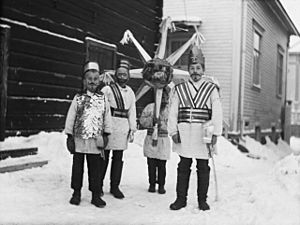
In Nordic countries, the Star boys' singing procession is known along the coast. It is not as common in towns further inland. In the late 1880s, many people did not like this Catholic way of organized begging. Officials started to ban the practice. By the 1900s, it had mostly disappeared.
Today, there are only a few places where the original Star boys' play is still performed without interruption. These include the islands of Amager in Denmark, and Haram and Vigra on the west coast of Norway. The most famous one is probably the Star boys' singing procession in Grimstad, a small town on the south coast of Norway.
Sweden
In the 1800s, Swedish Star boys started to join horse riding events on St. Stephen's Day (December 26). The tradition of Star boys singing and acting about Christmas, Saint Stephen, and Epiphany was usually performed from St. Stephen's Day until Epiphany.
Today, they are mostly seen at the end of the Lucia procession on December 13. They are with bridesmaids and elves. Recently, teachers and church leaders have tried to bring the play back for young children. They invite parents to schools, kindergartens, or churches to watch it. However, the funny folk parts of the play are often left out.
Finland
In Finland, a version of the Star boys' procession from the city of Oulu has become a beloved Christmas tradition across the country. This musical play is known as Tiernapojat. The Tiernapojat show is a regular part of Christmas celebrations in schools, kindergartens, and other places. It is also broadcast every Christmas on radio and television. The Finnish version includes parts that are not from the Bible. For example, King Herod defeats the "king of the Moors," and there is a short song praising Tsar Alexander.
Star Singer Songs
- Die heil′gen drei König′ mit ihrigem Stern, text and melody from Bavaria (18th century).
- Die Legende von den drei weisen Königen, text: Rolf Krenzer, melody: Ludger Stühlmeyer (ZDF-Star singer event 1999).
- Die Weisen aus dem Morgenland, text and melodie: Kurt Rommel.
- Drei Könige führte Gottes Hand, text: Friedrich Spee, melody: Cologn, 1880.
- Erfüll mit deinen Gnaden Herr Jesus dieses Haus (Ein Kind ist uns geboren), Leipzig 1884.
- Es ist für uns eine Zeit angekommen, text and melody from Swissland (19th century).
- Es ziehn aus weiter Ferne drei Könige einher, text and melody from Austria.
- Gott griaß enk Laidln ollesombt, megn sai so fü enk woin, from Bavaria.
- Heller Stern in der dunklen Nacht, text: Diethard Zils, melody: France 1874 ([[Il est né le divin enfant|Il est né le divin enfant]]).
- Hier kommen die Könige, sie folgen einem Stern, text: Rolf Krenzer, melody Peter Janssens.
- Nun sehet den Stern, den wir bringen, text: Georg Thurmair, melody: Adolf Lohmann.
- Seht den Stern, den wir euch bringen, text: Peter Gerloff, melody: Ludger Stühlmeyer, 2016.
- Seht ihr unsern Stern dort stehen, text: Zils, melody: France 18. Jahrhundert (Les Anges dans nos campagnes).
- Stern über Bethlehem, zeig uns den Weg, text and melody: Alfred Hans Zoller, 1964.
- Wir heil'gen drei Könige mit unserm Stern, Folk song.
- Wir kommen daher aus dem Morgenland, text: Maria Ferschl, melody: Heinrich Rohr.
- Wir sind die drei Könige, text and music: Kurt Mikula.
See Also
 In Spanish: Cantores de la Estrella para niños
In Spanish: Cantores de la Estrella para niños
- Cavalcade of Magi
- Chalking the door (Scotland)
- King Cake
- kolęda (Poland)
- Liturgical drama
- Medieval theatre
- Mystery play
- Rosca de reyes
- cs:Tříkrálová sbírka (Czech Republic)


